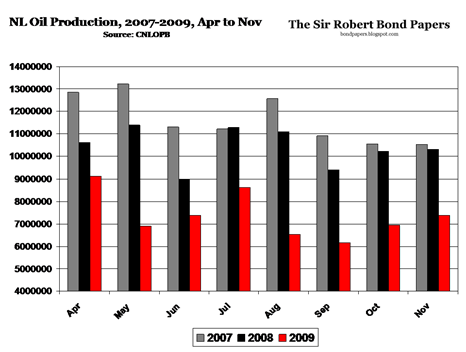While gross domestic product in Newfoundland and Labrador is now forecast by the provincial finance department to shrink by 8.5%, finance minister Tom Marshall today forecast he expected to receive $520 million more than budgeted last year in oil royalties.
That’s pretty much typical of the incongruity between what the “mid-year” financial update said about the economy and Marshall’s prediction of higher than expected revenues.
Here’s a summary of the 2009 economic performance to date in Newfoundland and Labrador, as presented by the finance department:
- Real gross domestic product is now expected to decline by 8.5% compared to 2008. That’s worse than the 7.7% drop forecast last spring.
- Oil production in the first nine months of calendar 2009 is down 20.6% compared to the same period in 2008.
- Despite that, the revised budget projection is for an increase in oil production to 101 million barrels by the end of March 2010 compared to the spring projection of 98 million barrels.
- The value of oil production is expected to decline by 45% compared to last year. That’s on a calendar basis.
- Government oil royalties on an accrual basis is expected to be $1.813 billion, an increase of $520 million over the forecast in Budget 2009.
- The value of mineral shipments is expected to be down by 56% compared to 2008.
- Mining employment down by 9% compared to 2008.
- Paper production is expected to be about 47% lower than in 2008.
- Retail sales and personal income are up slightly compared to 2008.
Some quickie observations:
Apples and oranges comparisons: Most of the economic information presented in the update compares performance over a calendar year while the budget works on a fiscal year.
To illustrate how this can have a distorting effect, consider that oil production in the first three months of calendar 2009 remained at 2008 levels of 10 and 11 million barrels per month. However, during fiscal 2009 thus far (starting in April) , monthly production has averaged about 30% below that. The first three months artificially inflate the average for the calendar year compared to the fiscal year.
Triple the year-to-date oil revenues and then some: As BP reported earlier, oil royalties in the first half of fiscal 2009 (Apr to Sep) totalled about $488 million. September’s royalties were 60% below the monthly average needed to hit the spring budget projection of $1.3 billion on an accrual basis. Overall, royalties are running about 15% below forecast.
The fall update now projects oil royalties at $520 million higher than forecast. That’s 40% higher than forecast, despite the prediction that the value of oil production will be down by 45% and that production will be down by at least 20%.
Oil royalties are function of price and production. Even if the royalty rate is higher in 2009 than 2008, lower production and lower average prices should produce lower royalties.
As it is, the revised oil royalty is only 8% below 2008’s figure despite a projected 45% drop in value and a 20% drop in production.
A missing chunk: On page nine of the budget speech from last spring, then finance minister Jerome Kennedy blamed the deficit on two things: the impact of the stock market on pension investments (about $380 million) and lost Equalization revenue owing to changes in the formula for 2009. That part was supposed to account for about $414 million.
There isn’t a single word about the pension plan investments and their current valuation in the update.
Hmmm.
Read the fine print: While things might just turn out to be as rosy and wonderful as the budget forecast, it might be useful to bear these words in mind. They come from page five of the budget update document itself:
However, at this time, there are four months remaining in the fiscal year, and there are many factors and uncertainties which may impact year end results.
Uh oh.
This wouldn’t be the first government that blew smoke to try and keep consumer wallets open through a rough patch. There are plenty of things in this budget update that don’t add up. Maybe they aren’t supposed to unless you realise that this update was less about the facts and more about the torque.
Whatever happens, we’ll know for sure in the spring.
-srbp-
